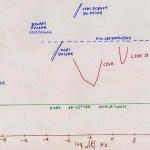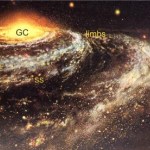gravitational
"Even in hindsight, I would not change one whit of the Voyager experience. Dreams and sweat carried it off. But most of all, its legacy makes us all Earth travelers among the stars." -Charley Kohlhase
In the early days of space exploration, it was quite a feat just to get up and out of Earth's atmosphere. There's are two good, simple reason for that, of course: first, it takes a lot of energy to go up that high...
Image credit: Nathan Bergey of http://psas.pdx.edu/orbit_intro/.
and second, if you don't get your spacecraft moving really fast, you're just going to fall back to…
"Great spirits have always encountered violent opposition from mediocre minds." -Albert Einstein
It may be hard to believe, seeing as how it's been our leading theory of gravity for nearly a century now, but Einstein's General Relativity is possibly the most frequently challenged scientific idea of all-time. Of course, it's emerged victorious from each and every one of those challenges, making a slew of unintuitive predictions that have been spectacularly confirmed each time they've been tested.
Image credit: Miloslav Druckmuller (Brno U. of Tech.), Peter Aniol, and Vojtech Rusin.
This…
No, not because it was too young to drink! Scientists at the Max Planck Institute for Extraterrestrial Physics were looking at some X-ray objects, and discovered something really weird: a very bright X-ray source moving out of a galaxy at nearly 3,000 kilometers/second! This thing is a goner. If our Sun were moving at even one quarter of that speed, it would get thrown out of our galaxy.
Now, here's the kicker: this isn't just any old object getting tossed out of a galaxy, it is a huge black hole! How huge? About 300,000,000 times the mass of our Sun. You read that number right: 300,000,000…
And if the band you're in starts playing different tunes
I'll see you on the dark side of the Moon.
One of my favorite readers, Zrinka, asks us why we're only able to see one side of the Moon from Earth. Seriously, look at the different phases; we always see the same side of the Moon:
How does this happen? Well, the Moon makes one revolution around the Earth about every 29 days, and that's what causes the Moon phases. But the Moon also rotates once every 29 days also. Because of this, the same side of the Moon always faces the Earth:
We call this "being locked." We're not the only system…
Nothing gets past you, does it? A scientific paper came out earlier this week, and I took a look at it, sighed, and Jamie asked me, "What?" And I said to her, "When I see bad science, it just makes me a little bit frustrated and sad." Of course, I had no intention to write about it.
But then Starts With A Bang reader Matt emailed me, and writes the following about this press release that he had seen:
You have two explanations for these gravitational waves now and that much I understand. But they make it sound as if symmetry breaking and inflation are competing theories. They aren't, right? Do…
So, what's the deal with this one? startswithabang.com reader Scott Stuart asks the following question:
I was reading "The First Three Minutes" last night and came across an
interesting section about blackbody radiation and energy density. The
author states that as the universe expands, the number of photons
running around (in the CMB, for example) is unchanged, but their
wavelengths get stretched. The energy in a photon is, of course,
inversely proportional to its wavelength, so the energy content of a
photon decreases as its wavelength increases. That seems to mean that
the total energy…
So last week I was up at Pacific University in Portland, OR for a job interview. As part of a faculty interview, you have to lecture on a topic for undergraduates, but they give you the topic just a couple of days before. My topic was Gauss' Law, which talks about the relationship between an Electric Field and an Electric Charge. Well, the same law holds for Newton's theory of Gravitation with a gravitational field instead of an electric field and a gravitational charge (i.e., mass) instead of an electric charge.
So I'm at work today thinking about this, doing the thing I do messing around…
The Universe isn't a static place. Although the laws of nature (physics, chemistry, biology, etc.) don't appear to change over time, everything in the Universe appears to evolve, and changes over time. One of the simplest ways that this happens is through Hubble expansion.
General relativity tells us how the Universe expands, and more specifically, it tells us that the expansion rate (which we call the Hubble constant, H0) is related to the total energy density of the Universe. More matter density: faster expansion. Greater density of photons (i.e., light): faster expansion. More of any and…







